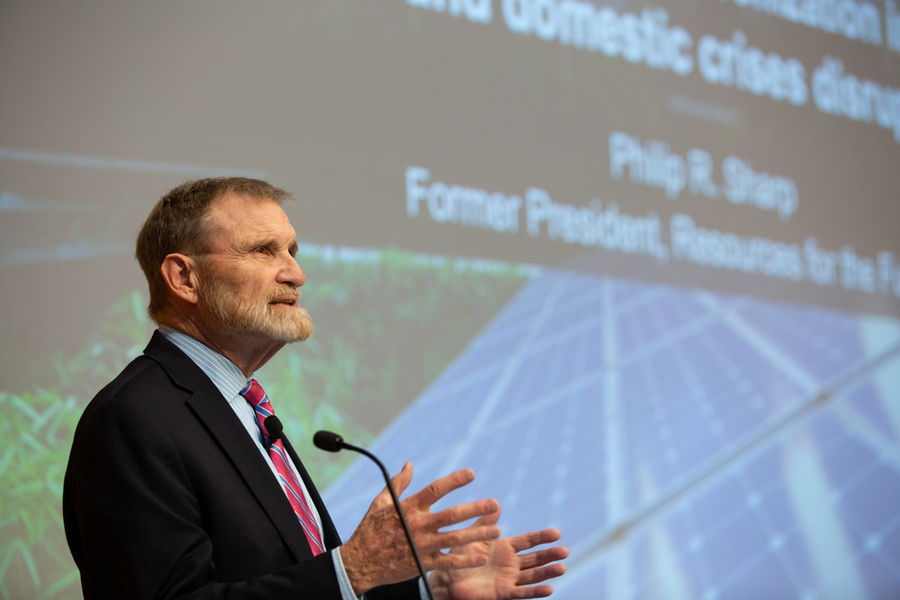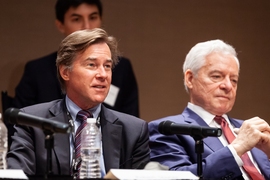A global pandemic. Russia’s invasion of Ukraine. Inflation. The first-ever serious challenge to the peaceful transfer of power in the United States.
Forced to face a seemingly unending series of once-in-a-generation crises, how can the world continue to focus attention on goals around carbon emissions and climate change? That was the question posed by Philip R. Sharp, the former president of Resources for the Future and a former 10-term member of the U.S. House of Representatives from Indiana, during his MIT Energy Initiative Fall Colloquium address, entitled “The prospects for decarbonization in America: Will global and domestic crises disrupt our plans?”
Perhaps surprisingly, Sharp sounded an optimistic note in his answer. Despite deep political divisions in the United States, he noted, Congress has passed five major pieces of legislation — under both presidents Donald Trump and Joseph Biden — aimed at accelerating decarbonization efforts. Rather than hampering movement to combat climate change, Sharp said, domestic and global crises have seemed to galvanize support, create new incentives for action, and even unify political rivals around the cause.
“Almost everybody is dealing with, to some degree, the absolutely profound, churning events that we are amidst now. Most of them are unexpected, and therefore [we’re] not prepared for [them], and they have had a profound shaking of our thinking,” Sharp said. “The conventional wisdom has not held up in almost all of these areas, and therefore it makes it much more difficult for us to think we know how to predict an uncertain future, and [it causes us to] question our own ability as a nation — or anywhere — to actually take on these challenges. And obviously, climate change is one of the most important.”
However, Sharp continued, these challenges have, in some instances, spurred action. The war in Ukraine, he noted, has upset European energy markets, but it has also highlighted the importance of countries achieving a more energy-independent posture through renewables. “In America,” he added, “we’ve actually seen absolutely stunning … behavior by the United States Congress, of all places.”
“What we’ve witnessed is, [Congress] put out incredible … sums of money under the previous administration, and then under this administration, to deal with the Covid crisis,” Sharp added later in his talk. “And then the United States government came together — red and blue — to support the Ukrainians against Russia. It saddens me to say, it seems to take a Russian invasion or the Chinese probing us economically to get us moving. But we are moving, and these things are happening.”
Congressional action
Sharp cautioned against getting “caught up” in the familiar viewpoint that Congress, in its current incarnation, is fundamentally incapable of passing meaningful legislation. He pointed, in particular, to the passage of five laws over the previous two years:
- The 2020 Energy Act, which has been characterized as a “down payment on fighting climate change.”
- The Infrastructure Investment and Jobs Act (sometimes called the “bipartisan infrastructure bill”), which calls for investments in passenger rail, electric vehicle infrastructure, electric school buses, and other clean-energy measures;
- The CHIPS and Science Act, a $280 billion effort to revitalize the American semiconductor industry, which some analysts say could direct roughly one-quarter of its funding toward accelerating zero-carbon industries and conducting climate research;
- The Inflation Reduction Act (called by some “the largest climate legislation in U.S. history”), which includes tax credits, incentives, and other provisions to help private companies tackle climate change, increase investments in renewable energy, and enhance energy efficiency; and
- The Kigali Amendment to the Montreal Protocol, ratified by the Senate to little fanfare in September, under which the United States agreed to reduce the consumption and production of hydrofluorocarbons (HFCs).
“It is a big deal,” Sharp said of the dramatic increase in federal climate action. “It is very significant actions that are being taken — more than what we would expect, or I would expect, out of the Congress at any one time.”
Along with the many billions of dollars of climate-related investments included in the legislation, Sharp said, these new laws will have a number of positive “spillover” effects.
“This enables state governments, in their policies, to be more aggressive,” Sharp said. “Why? Because it makes it cheaper for some of the investments that they will try to force within their state.” Another “pretty obvious” spillover effect, Sharp said, is that the new laws will enhance U.S. credibility in international negotiations. Finally, he said, these public investments will make the U.S. economy more competitive in international markets for clean-energy technology — particularly as the United States seeks to compete against China in the space.
“[Competition with China] has become a motivator in American politics, like it or not,” Sharp said. “There is no question that it is causing and bringing together [politicians] across blue [states] and red [states].”
Holding onto progress
Even in an uncertain political climate in which Democrats and Republicans seem unable to agree on basic facts, recent funding commitments are likely to survive, no matter which party controls Congress and the presidency, Sharp said. That’s because most of the legislation relies on broadly popular “carrots” that reward investments in decarbonization, rather than less popular “sticks” that create new restrictions or punishments for companies that fail to decarbonize.
“Politically, the impact of this is very significant,” Sharp said. “It is so much easier in politics to give away tax [credits] than it is to penalize or put requirements onto people. The fact is that these tax credits are more likely to be politically sustained than other forms of government intervention. That, at least, has been the history.”
Sharp stressed the importance of what he called “civil society” — institutions such as universities, nonprofits, churches, and other organizations that are apart from government and business — in promoting decarbonization efforts. “[Those groups] can act highly independently, and therefore, they can drive for things that others are not willing to do. Now this does not always work to good purposes. Partly, this diversity and this decentralization in civil society … led to deniers and others being able to stop some climate action. But now my view is, this is starting to all move in the right direction, in a very dynamic and a very important way. What we have seen over the last few years is a big uptick in philanthropy related to climate.”
Looking ahead
Sharp’s optimism even extended to the role of social media. He suggested that the “Wild West” era of social platforms may be ending, pointing to the celebrities who have recently lost valuable business partnerships for spreading hate speech and disinformation. “We’re now a lot more alert to the dangers,” he said.
Some in the audience questioned Sharp about specific paths toward decarbonization, but Sharp said that progress will require a number of disparate approaches — some of which will inevitably have a greater impact than others. “The current policy, and the policy embedded in this [new] legislation … is all about doing both,” he said. “It’s all about advancing [current] technologies into the marketplace, and at the same time driving for breakthroughs.”
Above all, Sharp stressed the need for continued collective action around climate change. “The fact is, we’re all contributors to some degree,” he said. “But we also all can do something. In my view, this is clearly not a time for hand-wringing. This is a time for action. People have to roll up their sleeves, and go to work, and not roll them down anytime soon.”









